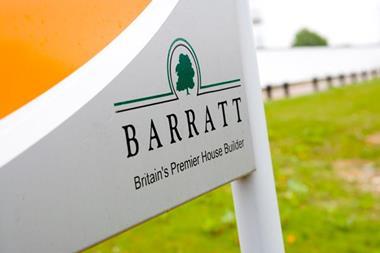Not for the first time, some of Britain’s biggest housebuilders have found themselves on Sajid Javid’s ‘naughty step’. The communities secretary is not only stopping their money-spinning sale of leasehold houses but also encouraging buyers to ‘dob them in’.

Announcing the government’s “crackdown on unfair leasehold practices”, Javid laid into a practice that had spiralled for several years but had largely gone unnoticed until morning TV presenter Victoria Derbyshire, the Daily Mail and other bastions of Middle England started campaigning against the ‘scandal’ of leasehold abuse and exponential ground rent hikes.
On 25 July, the Department for Communities and Local Government (DCLG) announced plans to ban new-build houses being sold as leasehold. The stress thus far is on new houses, although the government indicated it would examine ground rents across the wider market.
Leasehold has generally applied to flats with shared spaces, but developers – for some reason particularly in the North West – have been increasingly selling houses on these terms. I’d grown up under the impression that ‘ground rents’ and ‘peppercorn rents’ were almost interchangeable terms, and that’s what buyers (and their lawyers) who hadn’t scanned the small print of sales contracts seemed to have assumed as well.
Anything but. For months, the media have been interviewing angry homeowners issuing tales of woe, especially involving ground rents that double every 10 years, meaning that by 2060 the annual charge could hit at least £10,000, making them unsaleable.
‘Enough is enough’
The freeholds had generally been packaged up together and sold on to investors. Cases of abuse cited by the DCLG included a homeowner who was told by the developer that it would cost £2,000 to buy, but when the occupants approached the new owner, they were told it was £40,000. Another case had a homeowner being charged £1,500 by the company to make a small alteration to their home.
“It’s clear that far too many new houses are being built and sold as leaseholds, exploiting home buyers with unfair agreements and spiralling ground rents. Enough is enough. These practices are unjust, unnecessary and need to stop,” Javid fumed. That was just the official press release. When let loose in the BBC Radio 4 Today studio, he went a step further.

Although housebuilders would no longer be able to sell new houses with leases, he openly encouraged past buyers to seek compensation if they had lost out.
“Those buyers already facing difficulties need to seek redress from the housebuilder or, if the situation was not made clear at the point of sale, their solicitor”.
Writing in The Times, he issued the challenge: “If housebuilders aren’t prepared to step off the ground rent gravy train, I will derail it for them”.
Justin Madders, Labour member on the all-party committee on leasehold reform, has described the practice as “the PPI of the housebuilding industry”.
One chief of a top-10 housebuilder has dismissed the furore, saying that solicitors should have picked up on the terms in contracts. He might have a point, although he may have put it across too flippantly. Taylor Wimpey, however, seems to have figured out who’s going to win the housebuilder vs lawyer stakes and, in April, set aside £130m to settle what looks like a slew of future disputes. TW’s rivals have been rather more reticent in identifying their potential exposure.
Attack on land-banking to come?
Javid’s comments on developers have become more acerbic since the housing white paper, in terms of that old bugbear between housebuilders and politicians: ‘land banking’.
Tucked away in a bullet point, the DCLG press release hinted that the government could go into a more far-reaching assault. Measures would include “changing the rules on Help to Buy equity loans so that the scheme can only be used to support new build houses on acceptable terms”. Almost a quarter of all homes sold under the Help to Buy ‘equity loan’ scheme have been leasehold.

So far, Whitehall officials have been somewhat Delphic when asked whether these terms would only relate to leasehold issues or whether more root-and-branch changes were proposed in advance of the supposed termination of Help to Buy in 2021.
Leasehold has been a nice little earner for housebuilders, and the cash came in particularly useful when they were only just emerging from the last crash. But Help to Buy has been the goose that laid its golden eggs, so if Javid and his colleagues choose to trim its feathers ahead of schedule, it could prove costly indeed – especially if he again encourages buyers who think they have been overcharged to call in the lawyers.
Alastair Stewart is an equities analyst and commentator






























No comments yet